Questions for Christians
- What do I have in common with people in slum communities?
- How does Christian faith teach us to engage with people trapped in cycles of poverty?
- What do the global poor have to teach us?
- How ought Christians think of their wealth and privilege in light of the grave realities of global poverty?
- In a world of vast wealth inequality, how does the way of Jesus reorient our lives?
Overview
In a time of unprecedented wealth, prosperity, and technological innovation, it’s nearly unthinkable that issues of hunger and poverty continue to persist throughout the world today. And yet, that is the reality we live in. Throughout the whole of the Christian tradition, from the teachings of the Torah, the prophetic tradition of those like Amos, Isaiah, Micah, through the life, ministry, and teachings of Jesus, and in the practices of life and community for the early Church, care and concern for the poor have always been at the heart of God’s character and movement in the world.
In the Jewish creation story, God bestows upon humanity God’s own image. This image-bearing identity communicates God’s desire to co-create with humanity. The invitation for humanity then is to mirror the life-giving dignity that God displays in our care for one another as well as the creation that we inhabit. Poverty in the most basic sense robs people of the creative agency that God intended for all humans to embody; it is the inversion of God’s desires for the thriving mutuality of creation. Poverty, like all complex issues, carries with it individual as well as systemic causes. Unchecked free market capitalism places impoverished, formerly colonized nations at the mercy of their more developed neighbors. A lack of opportunities in these places leads to the inability to make a livable wage. These conditions set the stage for exploitation, crime, even unhealthy addiction and unnecessary familial, relational, and health stresses. These issues compound upon one another, and often have long, multi-generational effects.
Christians claim to follow Jesus, whose life was not insulated from poverty and oppression. While Jesus’ life modeled a proximity to the marginalized of his day, his teachings spoke even more explicitly as to what those who follow him ought to do with their wealth and resources. Mark 10 tells the story of Jesus’ interaction with the Rich Young Ruler. This man, confident in his practices of piety, asks Jesus what he must do to inherit eternal life. Jesus responds by inviting him to a complete obedience that goes beyond his religious practices; an obedience that rejects the security this young man had found in his possessions: “Jesus looked at him and loved him. ‘One thing you lack,’ he said. ‘Go, sell everything you have and give to the poor, and you will have treasure in heaven. Then come, follow me.’” The young man couldn’t go through with it, and walked away. Jesus’ followers, having witnessed this interaction, along with Jesus’ observation that wealth makes it challenging to enter the Kingdom of God, begin to wonder about the futures they have chosen for themselves: “Jesus, what about us, and what we’ve given up to follow you?” Jesus’ response to them is both challenging and comforting, essentially: “Yes, you’ve given up a lot relationally and materially, but because of this new family being formed, you’re always going to have more than enough.”
Though we must acknowledge the social and wealth stratification that does indeed exist for all sorts of Christians in the West, the undeniable privilege and wealth afforded to many Christians in industrialized nations must be seen through the invitations given in the passage above: the mastery of wealth and privilege in our lives can only be undone by the willingness to use it on behalf of our neighbors, global and local. Christians, given the promise of Jesus’ provision through the global Body of Christ, can trust that their own needs will indeed be taken care of as their attention and resources turn to the needs of our family who is affected most deeply by poverty. While humans cannot map our own experiences onto the mystery and magnitude of Jesus’ incarnation, we can in our small and faithful ways point to a God who is graciously generous, self-giving, and whose love undoes the impossibilities of our world as we know it.
8% of the world’s workers and their families live on less than this per day. (United Nations)
of deaths due to disasters occur in low- and middle-income countries. (United Nations)
of the world’s population in 2018 had no access to at least one social cash benefit (United Nations)
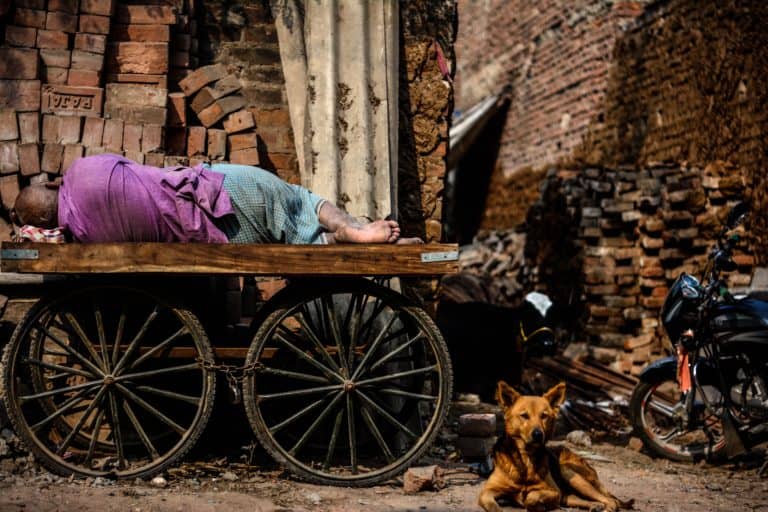
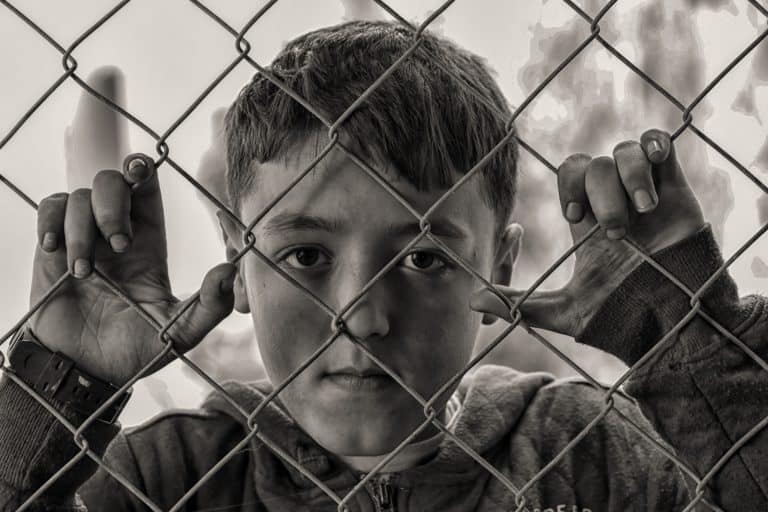
Why it matters
When Efren Roxas went to university as a young man in the Philippines in the 1980s, he moved north to Metro Manila, where he eventually dropped out of school and developed a drug and alcohol addiction. One afternoon, his wife Becky came home to find him drinking with a friend. Fed up, she went into their bedroom, found the gun that he used for protection, and pointed it at them in frustration. Terrified, they hopped out of the window, and fled. It would be months before Efren saw Becky again. While separated, Efren became a Christian, deciding to follow Jesus while watching a televangelist on TV late at night. This began his journey toward sobriety and eventually reconciliation with his wife and family. God would eventually call him and Becky into ministry, pastoring a church in their community, and eventually a network of churches in slum communities all throughout Metro Manila.
During this time as a pastor, Efren was involved in community organizing with a partnering international NGO (Servants to Asia’s Urban Poor). In this partnership, they advocated for their community to gain legal access to basic needs: water, electricity, plumbing. Over the course of more than a decade, Pastor Efren became instrumental in rallying a slum community the size of 24 acres to save money, collectively purchase land rights, and have permanent housing built on the land. Efren shared that some of the very people who would mock him as “Efren, the communist!” on the street are the very same people who to this day stop him in their neighborhood to marvel at how they now own homes and land titles.
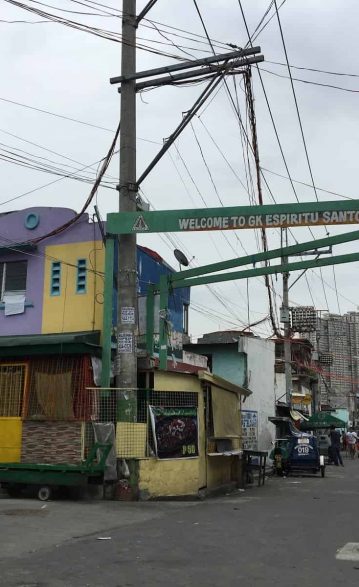
What you can do
Working toward ending poverty involves a confluence of many factors. We all have a part to play, and every step closer to ending poverty involves commitment and faithfulness. Efren’s story, above, illustrates how a community’s standard of living was affected by the transformation of individual people, the partnership of an international community, engagement with governmental and non-governmental agencies, and the empowerment of the materially poor themselves. The following calls to action are opportunities to discern what part you might play in ending global poverty.
Personal:
- To quote Gandhi, how can we “Live simply so others may simply live”? Choose to live below your means to create space for financial generosity in your life, and consider regularly contributing to a number of these organizations whose mission explicitly works to end global poverty. You can find a helpful list here.
- Consider a vocational shift: Is God inviting you to work alongside the poor toward development, empowerment, and the alleviation of poverty? Explore the following organizations, which do amazing, embodied work to engage with people and communities at the intersection of community and spiritual development:
Societal:
- Closely audit your faith community’s annual budget, and advocate for it to regularly and generously give towards organizations that work to end poverty in your city and across the globe.
- Explore how foreign aid is budgeted, and consider this as a factor of support during election seasons.
Short-term:
Support social enterprises with innovative ideas to end global poverty. An example of this is Good Paper, America’s leader in fair-trade greeting cards. The greeting card industry brings in $7.5 billion each year, and companies like Good Paper work to help share that money with people who, because of poverty, have been kept from benefiting from the global exchange of goods. Companies like Good Paper work to empower economically disenfranchised people, employing them with dignifying work.
Long-term:
Use the Lazarus at the Gate curriculum (see listof additional resources, below) to create giving circles in your community. Practice this regularly through various seasons of life to be informed of the newest developments in the fight to end global poverty, and toward deeper Christian discipleship.
“When a poor person dies of hunger, it has not happened because God did not take care of him or her. It has happened because neither you nor I wanted to give that person what he or she needed.”
Saint Teresa of Kolkata
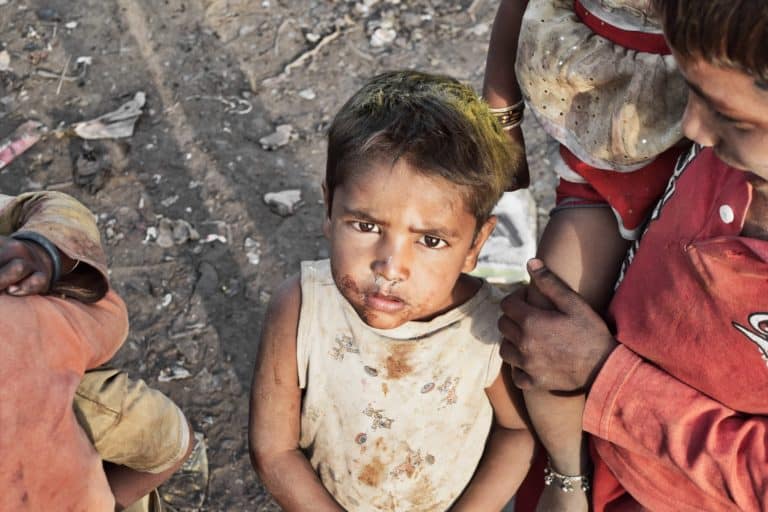
Will the Poor Always Be With Us?
By Bryant Myers
One sometimes hears Christians, tired with the news of poverty and exploitation around the world, try to deflect the news by reminding us that Jesus said, “The poor will always be with you.” This is offered as a way to stop the conversation.
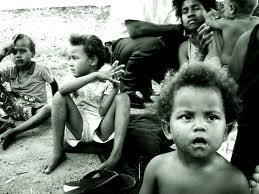
A Growing Movement to Overcome Global Poverty
By Ronald J. Sider
On June 28, I gathered in Britain with about 40 other American and British church leaders at Lambeth Palace for the London Forum to call on the leaders of the G-8 to expand our nations’ commitment to overcoming global poverty, especially in Africa.

The Dangers of Voluntourism
By Tania DoCarmo, Charlie Smith-Brake, and Julia Smith-Brake
There’s no doubt the church cares about orphans. For decades we’ve prayed, given money, and participated in international campaigns for “AIDS orphans” in Africa. We’ve supported orphans through child sponsorship,

The Holy Calling of Wealth Creation Isn’t So Simple
By Ron Sider
At a conference in March 2017, the Lausanne Movement and Business as Mission Global issued the important, helpful, and much-needed Wealth Creation Manifesto. While this manifesto is reflective
Additional Resources
- Lazarus at the Gate curriculum for Economic Discipleship
- Rich Christians in an Age of Hunger by Ron Sider
- Whole & Reconciled by Al Tizon
- When Helping Hurts by Steve Corbett and Brian Fikkert
- The New Friars by Scott Bessenecker
- The End of Hunger: Renewed Hope for Feeding the World by Jenny Eaton Dyer and Cathleen Falsani
- Al Jazeera documentary series on urbanization and the growth of slum communities in the Philippines
- Crash Course videos on Global Stratification and Poverty
- UN Sustainable Development Goals
- UN Sustainable Development Goals 2020 Report and the effects of COVID-19
- Charity Navigator helps people consider the effectiveness and impact of their charitable giving by rating NGOs in their efficient use of donations.
